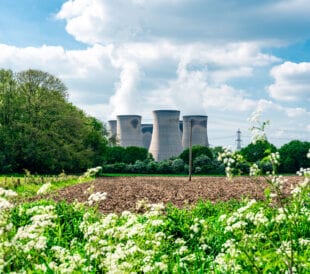
September 7, 2022, marks the third annual International Day of Clean Air for Blue Skies, with this year’s theme being ‘The Air We Share’. The observance, designated by the United Nations General Assembly, focuses on the transboundary nature of air pollution, and the increasing need for collective responsibility and international cooperation in the implementation of more efficient air pollution mitigation measures.
Double trouble
The negative impacts of air pollution are two-fold, the first being the well-known phenomenon of global warming. Although carbon dioxide is quite rightly touted as a greenhouse gas of concern, these emissions are only half of the story. In fact, short-lived climate pollutants (SLCPs) – such as methane and hydrofluorocarbons – can be many times more damaging to the environment. This highlights the need for mitigation strategies to minimize the release of all waste gases which contribute to climate change. The second impact of SLCPs, which is less frequently discussed, is the implications of these compounds on human health. Pollutants penetrating the lungs and bloodstream can be devastating to the human body, and can lead to a long list of illnesses including strokes, chronic respiratory diseases, lung cancers and heart attacks. Alarmingly, the World Health Organization estimates that less than one percent of cities in low and middle income countries comply with its recommended thresholds, and that poor air quality is responsible for around seven million deaths per year globally.
An international issue
Air pollution remains the greatest global environmental risk to human health, and it is imperative that international strategies are outlined and adopted by all major countries to turn the tide. The UN General Assembly has begun to take appropriate steps to tackle this issue, with Member States signing resolutions such as ‘The Future We Want’ and the ‘2030 Agenda for Sustainable Development’, outlining its road map for environmental protection. The International Day of Clean Air for Blue Skies marks the UN’s commitment to considerably reducing the number of illnesses and deaths due to SLCPs in the air, water and ground by 2030, with special attention being given to air quality and waste management within cities.
Global uncertainty
These international resolutions come at a time when the current stances of many large nations appear either unclear, or insufficient. For example, although China has pledged to become carbon neutral by 2060, it is in the process of building several new coal power plants, and emissions are on track to increase until at least 2030. Similarly, the Supreme Court of the United States limited the EPA’s authority to regulate power plant emissions, while, conversely, the Methane Emissions Reduction Program – a provision in the recently passed Inflation Reduction Act – allocates funding to support emission monitoring and waste reduction in petroleum and natural gas systems. Additionally, India is still heavily reliant on fossil fuels for its energy needs, and its carbon emissions continue to rise. So much so, that Climate Action Tracker – a consortium that tracks government climate action – has given it an overall rating of ‘highly insufficient’.
Breathe easy
Whatever the next few years holds for US and global air pollution regulations, be assured that there are air monitoring technologies available to help navigate the ever-changing regulatory landscape and satisfy even the most stringent of guidelines. Please join us in marking the International Day of Clean Air for Blue Skies, and help us shape a future where we can all breathe a little easier.






Leave a Reply